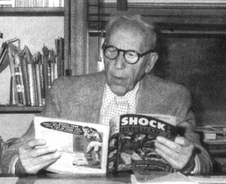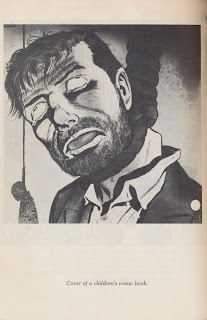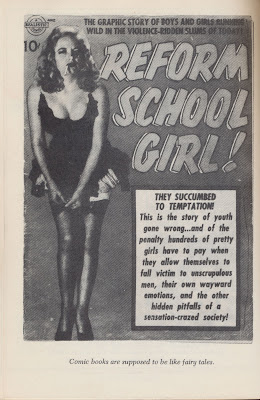Featured below are photocopies of the lurid illustrated plates at the center of the book Seduction of the Innocent (1954) by psychiatrist Dr. Fredric Wertham, M.D., the classic expose of 1940s and 50s horror and crime comic books as the cause of juvenile delinquency. Wertham was a correspondent of Sigmund Freud; his court testimony of serial child murderer Albert Fish declared him insane; and during that era he was a noted expert whose advice was sought by many defense counsels, district attorneys, judges and legislators. His polemic against comic books, while genuine in its concern for the welfare of children and its sense of outrage against the industry's commercially driven depictions of gratuitous incitements to violence, was
marked by a sensationalist and paranoid tone and many speciously argued points. The book sparked the U.S. Congressional inquiry into the comic book industry and led to the creation of the artistically repressive Comics Code Authority.
The Code ushered in an era of mediocre and sanitized work in comics, just as the early vitality of rock and roll was set back by arrests of Chuck Berry and Jerry Lee Lewis for their foolish decisions to engage in sex with minors (in Lewis's case in a marriage to his 13 year old cousin) and by the deaths of Buddy Holly and Elvis's enrollment in the Army. As rock music needed the jolt of originality and energy which the Beatles, Motown and Bob Dylan brought in the early 60s, so too did comics wander in the wilderness of lameness until Marvel Comics writer and editor Stan Lee and his irrepressibly creative artistic collaborators Jack Kirby and Steve Ditko revitalized the form around the same time. And later in the turbulent 60s decade, Robert Crumb and Gilbert Shelton, who were the artistic children of the godfather of American satire and founder of Mad Harvey Kurtzman, would spearhead the underground comics revolution - an explosion of wild sex, rampant drug use, untrammeled profanity, willful subversion against all forms of authority and utter disregard for everything the Comics Code sought to impose.
As described by pioneering comics fan and critic Dwight R. Decker:
In the late 1940s and early 1950s, a distinguished psychiatrist named Dr. Fredric Wertham made a name for himself in the United States by leading a crusade against violent comic books. His 1954 book exposing the comic-book industry, Seduction of the Innocent , is still remembered in American comics fandom as a wildly exaggerated and overwrought polemic and has gone on to become a collector's item in its own right. Even the comic books mentioned in the text or used as source illustrations have also become collector's items because of their association with him and the book. Facing a public relations nightmare and hearings by the US Senate subcommittee on juvenile delinquency, fearful publishers either went out of business or banded together to form a Comics Code Authority that would censor comic books before some outside body did it for them.
American comics fans have no cause to love Dr. Wertham. They remember him as the man who attacked comics with his hysterical book, helped kill EC Comics (the one publisher doing anything like adult-level material), and brought on the Comics Code that reduced American comics to a childish mentality. Many fans have associated Dr. Wertham with Senator Joseph McCarthy, well-known for his anti-Communist crusade at about the same time, and legends circulate of Dr. Wertham accusing comic books of being a Communist plot or some such.
http://art-bin.com/art/awertham.html - "Fredric Wertham - Anti-Comics Crusader Who Turned Advocate"
by Dwight Decker
Decker goes on to describe his meeting with Dr. Wertham, starting with a correspondence with the aging psychiatrist in 1969. Wertham's interaction with the young collector and fanzine writer Decker took an unexpected turn:
Dr. Wertham then expressed curiosity about fanzines and fandom. I wrote back answering his questions - and the next thing I knew, I was hearing that he was writing to fanzine publishers and requesting copies of their publications. Dr. Wertham's letters even began appearing in fanzine letter columns, often politely justifying his views on violence and the media to unsympathetic fan editors, often just participating in the conversation and commenting amiably about unrelated matters brought up in a previous issue. In his own way, he was getting involved in fandom. Still, there was always an element of suspicion and distrust on the part of comics fans. No one was quite sure what he was really after. Some people, fearing a Seduction -style hatchet job on fandom, flatly refused to send him their fanzines; others did so reluctantly.
What Dr. Wertham was up to turned out to be his last book, published by Southern Illinois University Press in 1974: The World of Fanzines: A Special Form of Communication. It wasn't a hatchet job at all. Quite the opposite: it was a love letter to comics fandom. This was the man who had blasted comic books in Seduction of the Innocent and A Sign for Cain, accusing them of every sin he could think of, including making their readers into moral monsters - now Dr. Wertham was praising the efforts of comic-book readers, and presenting our internal hobby publications as the very model of non-violent communication by bright young people.
(C) 1953, 1954 by Fredric Wertham, published by Rinehart & Company, inc.
TESTIMONY OF WILLIAM M. GAINES, PUBLISHER, ENTERTAINING
COMICS GROUP, NEW YORK, N. Y.
The CHAIRMAN. You may proceed in your own manner.
Mr. GAINES. Gentlemen, I would like to make a short statement. I am here as an individual publisher.
Mr. HANNOCH. Will you give your name and address, for the record?
Mr. GAINES. My name is William Gaines. My business address is 225 Lafayette Street, New York City. I am a publisher of the Entertaining Comics Group.
I am a graduate of the school of education of New York University. I have the qualifications to teach in secondary schools, high schools.
What then am I doing before this committee? I am a comic-book publisher. My group is known as EC, Entertaining Comics.
I am here as a voluntary witness. I asked for and was given this chance to be heard.
Two decades ago my late father was instrumental in starting the comic magazine industry. He edited the first few issues of the first modern comic magazine, Famous Funnies. My father was proud of the industry he helped found. He was bringing enjoyment to millions of people.
The heritage he left is the vast comic-book industry which employs thousands of writers, artists, engravers, and printers.
It has weaned hundreds of thousands of children from pictures to the printed word. It has stirred their imagination, given them an outlet for their problems and frustrations, but most important, given them millions of hours of entertainment.
My father before me was proud of the comics he published. My father saw in the comic book a vast field of visual education. He was a pioneer.
Sometimes he was ahead of his time. He published Picture Stories from Science, Picture Stories from World History, and Picture Stories from American History.
He published Picture Stories from the Bible.
I would like to offer these in evidence.
The CHAIRMAN. They will be received for the subcommittee's permanent files. Let that be exhibit No. 11.
(The documents referred to were marked "Exhibit No. 11,", and are on file with the subcommittee)
Mr. GAINES. Since 1942 we have sold more than 5 million copies of Picture Stories from the Bible, in the United States. It is widely used by churches and schools to make religion more real and vivid.
Picture Stories from the Bible is published throughout the world in dozens of translations. But it is nothing more nor nothing less than a comic magazine.
I publish comic magazines in addition to picture stories from the Bible. For example, I publish horror comics. I was the first publisher in these United States to publish horror comics. I am responsible, I started them.
Some may not like them. That is a matter of personal taste. It would be just as difficult to explain the harmless thrill of a horror story to a Dr. Wertham as it would be to explain the sublimity of love to a frigid old maid.
My father was proud of the comics he published, and I am proud of the comics I publish. We use the best writers, the finest artists; we spare nothing to make each magazine, each story, each page, a work of art.
As evidence of this, I might point out that we have the highest sales in individual distribution. I don't mean highest sales in comparison to comics of another type. I mean highest sales in comparison to other horror comics. The magazine is one of the few remaining ─ the comic magazine is one of the few remaining pleasures that a person may buy for a dime today. Pleasure is what we sell, entertainment, reading enjoyment. Entertaining reading has never harmed anyone. Men of good will, free men should be very grateful for one sentence in the statement made by Federal Judge John M. Woolsey when he lifted the ban on Ulysses. Judge Woolsey said:
It is only with the normal person that the law is concerned.
May I repeat, he said, "It is only with the normal person that the law is concerned." Our American children are for the most part normal children. They are bright children, but those who want to prohibit comic magazines seem to see dirty, sneaky, perverted monsters who use the comics as a blueprint for action.
Perverted little monsters are few and far between. They don't read comics. The chances are most of them are in schools for retarded children.
What are we afraid of? Are we afraid of our own children? Do we forget that they are citizens, too, and entitled to select what to read or do? We think our children are so evil, simple minded, that it takes a story of murder to set them to murder, a story of robbery to set them to robbery?
Jimmy Walker once remarked that he never knew a girl to be ruined by a book. Nobody has ever been ruined by a comic.
As has already been pointed out by previous testimony, a little healthy, normal child has never been made worse for reading comic magazines.
The basic personality of a child is established before he reaches the age of comic-book reading. I don't believe anything that has ever been written can make a child overaggressive or delinquent.
The roots of such characteristics are much deeper. The truth is that delinquency is the product of real environment, in which the child lives and not of the fiction he reads.
There are many problems that reach our children today. They are tied up with insecurity. No pill can cure them. No law will legislate them out of being. The problems are economic and social and they are complex.
Our people need understanding; they need to have affection, decent homes, decent food.
Do the comics encourage delinquency? Dr. David Abrahamsen has written:
Comic books do not lead into crime, although they have been widely blamed for it. I find comic books many times helpful for children in that through them they can get rid of many of their aggressions and harmful fantasies. I can never remember having seen one boy or girl who has committed a crime or who became neurotic or psychotic because he or she read comic books.
See also:
www.seductionoftheinnocent.org - "The web's orginal Seduction of the Innocent site"

















